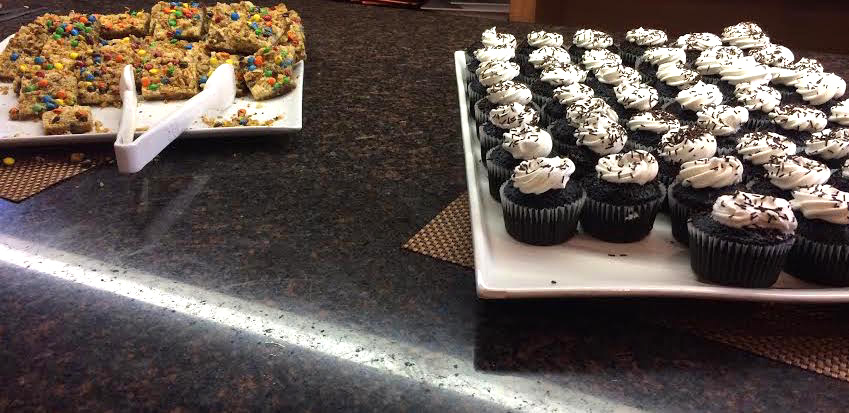The Quad: What causes dessert cravings?

(Brenda Chan/Daily Bruin)
By Brenda Chan
Nov. 28, 2016 3:17 p.m.
Whenever De Neve dining hall has deep dish s’mores I simply cannot resist getting some for dessert, topped with some vanilla ice cream. Although many of us crave dessert from time to time, we may not know where our cravings come from.
Many people may enjoy dessert out of habit, since we do not get a sense of closure without satisfying our sweet tooth after a meal. These dessert cravings may be caused by chemical reactions that occur in our brains after consuming these sweet treats.The way in which desserts are metabolized in our bodies and how they affect us both physiologically and psychologically are what cause us to crave desserts.
The macronutrients contained in dessert have a strong relationship to the effects they have on our brains, and therefore on our cravings. One serving of deep dish s’mores at De Neve Dining contains 372 calories, 17.6 grams of fat, 55.9 grams of carbohydrates (20.4 grams of which are sugars) and 3.2 grams of protein. Although not all desserts have the same macronutrient content, they tend to be sources of significant amounts of fat, carbs and sugar.
Humans crave sugar for evolutionary reasons. When sugar is consumed, it is broken down into glucose and fructose by insulin that is secreted by the pancreas. While glucose can travel through the bloodstream and be metabolized by every cell in the body, fructose (found in natural sources of sugar such as fruits) can only be metabolized by the liver and an excess of it is more likely to be stored as fat. The difference in the way fructose is metabolized has been used by our bodies for survival purposes – in a pre-modern diet and pre-Netflix human environment, fat storage was more beneficial than harmful.
In order to avoid starvation, a mutation occurred in our ancestors that resulted in even small amounts of fructose in the body being stored as fat. Since food was scarce for our ancestors, they needed these sugary cravings so that they would consume more sugar whenever it was available. When our ancestors consumed sugar, increases in pleasure-inducing neurotransmitters such as dopamine in the brain caused them to crave more of it. The purpose of this was so that their bodies would hold onto more fat in order to prepare for possible starvation later on.
Studies have shown that sugar is addictive and stimulates the same pleasure centers of the brain that are activated with drugs. Since desserts contain a lot of sugar, its consumption causes the release of dopamine which is an integral aspect of the brain’s “reward system.” When we eat too much sugar, we become addicted over time, as we constantly crave the “high” that dopamine brings. This is why we can’t resist eating another chocolate chip cookie once we have started.
Some of us may notice that our dessert cravings are strongest when midterms and finals are around the corner, as this is when we start to stress eat. This is due to the fact that carbs in desserts cause the brain to release another “feel-good” neurotransmitter called serotonin which soothes our anxieties.
When people are feeling low, they tend to crave food like ice cream and cake instead of brown rice. Even though these are all sources of carbs, not all carbs have the same effect on our bodies. Simple carbohydrates found in desserts are absorbed into the bloodstream much quicker than the complex carbohydrates found in brown rice, leading to a quicker boost in serotonin levels and thus a faster improvement in mood.
Our bodies are hardwired to send us signals when we are nutritionally deficient in something like magnesium. Likewise, when we are deficient in the essential fatty acids – omega-3 and omega-6 – our bodies send signals that encode us as craving fat. There are a lot of healthy fats that we can consume to satiate this need, but due to the pleasure-mediating effects of dopamine and the mood-regulating effects of serotonin that result when devouring sugar-loaded fatty desserts, some of us would much rather have a slice of cake than a handful of almonds.
Psychological reasons can also cause us to crave desserts. A study shows that mental imagery plays a significant role in the development of food cravings. When we daydream about eating cake or come across a BuzzFeed food video on our Facebook news feed, our cravings for these foods will tend to increase. The more vivid the mental imagery is, the more intense food cravings will be.
Food cravings can also be a result of boredom or sadness. Sometimes we just want to munch on something sweet even though we may not have any strong cravings. Eating desserts can also be an avenue for some of us to escape reality, as it provides temporary relief from the stressfulness of college life.
Next time when you beat yourself up over eating that extra cookie, just remember it is not always about a lack of self-control when it comes to dessert cravings. Physiological and psychological factors as a result of evolutionary adaptation to a food environment greatly modified by agriculture long ago give rise to these unhealthy cravings.


